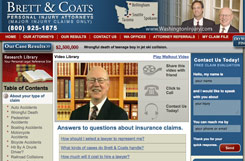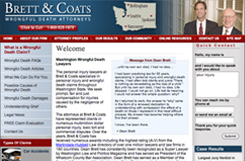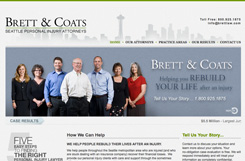Share Your Story
Click here to share your story about drunk driving.
On July 17th, 2003 at 1 a.m. while working a vehicle accident, I was struck by a drunk driver. I lost everything I had. My wife left, as 1 year of watching me have seizures and not get better was too much for her. More
Drunk Driving News
Drunk Driving Fatalities Drop to Lowest Rate since 1950
The U.S. Department of Transportation recently announced that U.S. fatalities due to drunk driving fell to a record low number in 2009, declining by 7.4% from 2008, with a 19% decrease since 2000. This represents the lowest number since 1950. More
Drug and Alcohol Courts: An Effective Alternative to Jail
Drug courts were developed in the 1980's in an effort to stop the abuse of alcohol and other drugs, and to reduce the criminal activity that typically accompanies these behaviors. More
Hold Drunk Drivers Responsible
Driving while distracted – the new DUI
Even though we have focused a great deal of attention on drunk driving, we are now seeing a new threat that is equally common and equally dangerous – distracted driving. While it is well documented that drunk driving is a leading cause of traffic accidents, injuries, and fatalities, it is clear that distracted driving is just as dangerous, just as destructive, and just as damaging to people, families, and society. Since the dangers are as real as those related to drunk driving, the penalties should also be as real.
Distracted driving has been defined as "any non-driving activity a person engages in that has the potential to distract him or her from the primary task of driving and increase the risk of crashing." These activities can include eating, talking to passengers, changing the radio station or CD, using a navigation system, and reading a map. But one of the most common distractions on the roads today is the cell phone.
Numerous studies have concluded that the impairments associated with using a cell phone while driving can be as profound as those associated with driving while drunk. The dangers of distracted driving are highlighted in the following statistics, gathered from various sources as found on the U.S. Department of Transportation website (http://www.distraction.gov/):
- Using a cell phone while driving, whether it’s hand-held or hands-free, delays a driver's reactions as much as having a blood alcohol concentration at the legal limit of .08%. (Source: University of Utah)
- Nearly 6,000 people died in 2008 in accidents involving a distracted or inattentive driver, and more than half a million were injured. (NHTSA)
- 80% of all crashes and 65% of near crashes involve some type of distraction. (Source: Virginia Tech 100-car study for NHTSA)
- The worst offenders are the youngest and least-experienced drivers: men and women under 20 years of age. (NHTSA)
- Drivers who use hand-held devices are four times as likely to get into accidents serious enough to injure themselves. (Source: Insurance Institute for Highway Safety)
Fatalities:
In 2008, there were a total of 34,017 fatal crashes in the United States, in which 37,261 individuals were killed. Distraction was reported for 11% of the drivers involved in fatal accidents, resulting in 5,870 fatalities (16% of the overall fatalities).
Injuries:
In 2008, an estimated 2,346,000 people were injured in motor vehicle traffic crashes; 515,000 of them were injured during an accident with reported distraction - 22% of all the injured people.
While these numbers demonstrate how significant the problem is, they do not come close to showing the true size of this growing danger, since law enforcement has a difficult time identifying the role of distraction in a crash.
Changes in related Washington State Law are being enacted through Senate Bill 6345. Currently, two laws are in place that make texting and cell use without a hands-free device a Secondary Offense, meaning that the only way to be ticketed for a violation is to be caught committing a primary driving offense as well. The passage on March 11, 2010 of Senate Bill 6345 removes the Secondary Offense and makes both Text Messaging and Cell Phone use while driving a Primary Offense. This means if a driver is seen by an officer driving while texting or talking on a cell phone without a hands-free device, the driver can be ticketed for that offense alone. (Read the entire bill at http://apps.leg.wa.gov/documents/billdocs/2009-10/Pdf/Bills/Senate%20Passed%20Legislature/6345-S.PL.pdf) While these new laws may deter some drivers from using cell phones while driving, there will certainly be others who ignore the dangers associated with distracted driving and who continue to engage in these dangerous behaviors.
In addition, a new study done by the Highway Loss Data Institute examined insurance claims from accidents before and after such bans took effect, and found that insurance claim rates did not go down after the laws were enacted. It also found that there was no change in patterns compared with nearby states without such bans. Other studies have shown the same results. One reason for this lack of change may be that using a hands-free device for a cell phone may be just as risky as holding the phone in the hand, and may cause the same level of distraction for the driver. (Access study information at http://www.iihs.org/news/rss/pr012910.html)
Since the dangers of distracted driving are very clear, and the effectiveness of related legislation is doubtful, the only way to reduce the risks associated with distracted driving is to create stiff penalties for those drivers caught engaging in these risky behaviors, and to hold drivers accountable by making them pay for the injuries and damage they cause to innocent people. Society must be committed to holding people responsible for their choice to engage in dangerous behaviors. Only when drivers understand that distracted driving is as dangerous as drunk driving, and that if caught they are subjected to the same legal penalties, will society see a significant reduction in this massive and growing public safety problem.




